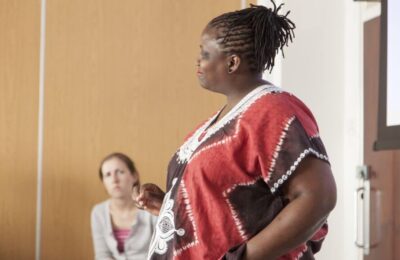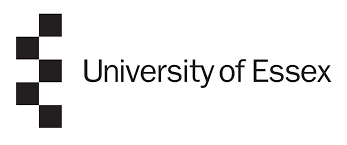
Systemic Psychotherapy (M6)
Join the UK’s longest-running systemic psychotherapy qualifying training
This course is a rigorous and intensive programme, with a focus on developing your personal and professional identities and aspects of selves in the multiplicity of contexts that impact your thinking and practice, embedding a decolonial, anti-discriminatory, and ethical stance.
Based at the Tavistock Centre, which has a national and international reputation for excellence in psychotherapy training and clinical services, you will have access to a range of adult and CAMHS clinical placements, experienced supervisors and high-calibre academic tutors.
Successful completion provides you with a professional qualification accredited by the Association for Family and Systemic Psychotherapy (AFSP) and enables you to register with the United Kingdom Council for Psychotherapy (UKCP).
Applications for this course are now closed for September 2026 entry. Register your interest to be notified when applications open for 2027 entry.
About this course
Clinical supervision
You will provide systemic psychotherapy to clients/service users which will be supervised live by a trained systemic supervisor in clinical supervision groups. You will meet in the group for up to five hours per week throughout the two years of the course. You will work with families across the life cycle stages, either in a child and adolescent mental health service (CAMHS) or an adult setting, taking a range of referrals and presenting problems.
Consulting relationships between peers are set up as part of the clinical supervision process (and in other contexts). The consultation role that you take within your consulting partnerships will develop your capacity for leadership.
Clinical work
You will also need to set up your own clinical work and systemic supervision, which will be with a qualified systemic psychotherapist in your external agency or placement, and keep a log of your hours and learning. This is required by the Association for Family and Systemic Psychotherapy to enable you to practise new skills and theoretical learnings.
We will only be able to accept you on the course if you have set up your own clinical work and you will need a systemic supervisor for this work. The supervision does not need to be live but can be retrospective if it is conducted at least once a month.
Personal and professional development
As a therapist you will be required to reflect upon your own personal life experiences and share these with other students and tutors to understand the connections between you and the clients you work with. Much of this activity will take place in groups.
This is an important reflective space where you will be encouraged to think about your contribution to group dynamics and the wider organisational system being created in this learning environment. Attending a Group Relations Conference is a requirement of the course.
As part of your application, you are required to write a personal statement which should include reference to your family of origin and incidents in your personal life that influence who you are and why you would like to be considered for the Master’s.
Research
The research aspect of this course is designed to help you develop a research ‘frame of mind’ by introducing you to quantitative and qualitative research paradigms and research methods. You will either complete a research portfolio or a research dissertation.
Teaching and consultancy
This is a unique part of our course and much valued by our students. You will be offered the opportunity to embed your systemic knowledge by teaching and offering consultation to groups of professionals externally. One of your assignments will be setting up a short piece of teaching usually in your work context.
Lectures and seminars
Our teaching occurs once a month on Thursdays and Fridays. There are events and seminars which happen outside of the teaching blocks and we will let you know the dates of these in advance.
Modules
Module 1: Advanced Systemic Theoretical Ideas
- Year one
- FHEQ level 7
- 20 credits
- Core module
- Module lead: Joanne Adams
Module aims
The aims of the module are to:
- extend your knowledge of the theoretical concepts in the systemic psychotherapy field
- substantially develop your capacity to articulate and critically evaluate these theoretical concepts and present them fluently to others with particular attention to the self of the therapist and to contextual influences like race, culture, gender, class, sexuality, religion, neurodiversity, age, and many intersecting aspects of individual and social identities
Module assessment
You are required to submit a 3,500 word essay.
Module 2: Advanced Systemic Clinical Practice 1
- Year one
- FHEQ level 7
- 20 credits
- Core module
- Module lead: Shila Rashid
Module aims
The aims of the module are to:
- enable you to work effectively with complex cases involving emotive or charged issues
- enable you to conceptualise and to apply a range of Systemic concepts and approaches to their work
- support you to take responsibility for developing and improving your clinical and organisational knowledge and skills, and those of your colleagues, through reflection, self-reflexivity and critical analysis of your own and each other’s work
Module assessment
You are required to submit a clinical portfolio, comprising 10 learning logs of 1,000 words each, plus a self-report of 1,500 words.
Module 3: Research Methods
- Year one
- FHEQ level 7
- 20 credits
- Core module
- Module leads: Joanne Adams and Shila Rashid
Module aims
The aims of the module are to:
- familiarise you with a range of research approaches relevant to systemic psychotherapy practice
- develop a critical awareness of the research base for systemic family therapy
Module assessment
You are required to submit a 3,500 word essay.
Module 4: Advanced Systemic Clinical Practice 2
- Year two
- FHEQ level 7
- 20 credits
- Core module
- Module leads: Shila Rashid
Module aims
The aims of the module are to:
- strengthen the link between theoretical ideas and clinical practice, with attention to different clinical contexts
- train you as a highly skilled systemic clinician, that can provide a variety of different interventions closely linked to theoretical concepts and ideas in the systemic field
Module assessment
You are required to submit a clinical portfolio, comprising 10 learning logs of 1,000 words each, plus a self-report of 1,500 words.
Module 5: Clinical Development
- Years one and two
- FHEQ level 7
- 20 credits
- Core module
- Module lead: Rukiya Jemmott
Module aims
The aims of the module are to:
- enhance your ability to understand the application of systemic practice in different contexts
- enable you to recognise your own contribution in multidisciplinary settings, and appreciate the different influences on this
- enable you to articulate the connections between theory and practice
Module assessment
You are required to undertake a 40 minute clinical presentation, including two recorded clips, which should last at least ten minutes. You are also required to submit a 1,500 word summary.
Module 6: Systemic Leadership, Consultation and Teaching
- Years one and two
- FHEQ level 7
- 20 credits
- Core module
- Module lead: Sally Bates
Module aims
The aims of the module are to:
- support your journey of development from systemic psychotherapist in training to becoming a qualified systemic psychotherapist
- enable you to perceive yourself as leaders in organisations, equipped as an agent for change and development in public, private and third sector institutions
Module assessment
You are required to prepare, deliver and record a 1.5-hour teaching session on a systemic concept. You must then deliver a 20 minute presentation, including a 5 minute clip from this recording, and submit a 2,000 word reflexive summary.
Module 7: Dissertation
- Year two
- FHEQ level 7
- 60 credits
- Core module
- Module leads: Joanne Adams and Shila Rashid
Module aims
The aim of the module is to extend the knowledge and skills developed in year one to complete a dissertation, which can take the form of either a:
- research dissertation which comprises of a small clinical research study, where the research question is of relevance to systemic practice
- research portfolio which comprises of three research-related assignments, each addressing a different set of research competencies
Module assessment
You are required to submit either a 12,000 word research dissertation, or a research portfolio, made up of two 4,000 essays and a 4,000 word research proposal.
Who is this course for?
This course is for professionals who have completed the foundation and intermediate levels of systemic training and are currently working in the field of mental health, social work/care or education.
Course details
To undertake this course, you need to:
- hold a professional qualification in social work, teaching, psychology, psychiatry, psychotherapy, nursing or an affiliated discipline, or equivalent
- hold an undergraduate degree or be able to demonstrate that you meet the demands of a Master’s (FHEQ level 7) course
- have completed an AFT-accredited intermediate level systemic/family therapy training course. Please note that this is a mandatory requirement – we can only accept applications from those who have completed or are in the process of completing an intermediate level training such as our Systemic Approaches to Working with Individuals, Families and Organisations PgCert
- be currently working in the field of mental health, social work/care or education, where you have regular contact with families and can practice systemic psychotherapy for a minimum of 100 hours annually while attending the course
In addition, as part of your application, you are required to submit a short essay of 1,500 words, discussing one of the following subjects:
- power and responsibility
- use of self and self-reflexivity
- personal and professional use of self
- managing risks in the therapeutic relationship
- relational risk-taking
- resilience and hope
You may venture as widely as you wish or stay close to the subject of therapy in your essay and will need to include personal reflections and any systemic ideas that you connect to the theme. Your grasp of theoretical ideas and the ability to be self-reflexive will be considered. Please use the Harvard referencing style.
Personal statement
In addition to the essay, you are required to write a personal statement including personal information about your family of origin and how this connects to your development so far. Please write about your relationships from your early life as well as present day, and any significant episodes that you feel connect to your learning about yourself. Please let us know about your aspirations for your future career.
This section does not need referencing and should be a maximum of 500 words.
If you do not have an undergraduate degree or have completed your intermediate level training more than four years ago, please see below as you will have to complete a longer essay in place of this. You will only need to complete one essay as part of your application. If you are unsure what you need to complete, please contact us for confirmation.
Applicants without an undergraduate degree and/or who have completed their intermediate training more than four years ago can demonstrate equivalency by:
- completing a 3,500 word essay discussing and critiquing a systemic theoretical idea of your choice. Your ideas must be up-to-date theoretically and you need to demonstrate self-reflexivity. Please note that applicants are required to use Harvard referencing
- providing us with details of any relevant CPD courses you have undertaken, if you have completed your intermediate training more than four years ago
Applicants who do not have a professional qualification
If you do not have a previous professional qualification, you may still be eligible to apply for the Master’s. However, you will need to complete a portfolio detailing a body of clinical work and training that demonstrates equivalence to a first profession.
You are required to upload your portfolio at the time of application. Please provide this in CV style, and specify where you have worked, your responsibilities and the duration of each post. In addition, please tell us about any further training or CPD that you have completed.
Please provide as much information as you can; the more detailed the portfolio, the easier it is for the tutors to assess an applicant’s suitability for the course.
Clinical experience
Examples of suitable professions are:
- social worker
- nurse
- doctor
- psychologist
- counsellor (accredited to a professional body)
- teacher/pastoral worker with substantial experience working with families
- music/drama/art therapist
If you are unsure about your clinical experience, please contact us to arrange a conversation with a member of our course team.
Tuition fees
Home (2026/27)
£9,040 per year
International (2026/27)
£18,080 per year
Annual fee increases
Tuition fees are charged for each year of your course. If your course is longer than one year, the fees may be subject to annual inflationary increases. For more information on tuition fee changes, including paying for tuition fees, please refer to our tuition fee guidance.
Funding
Student loans
If you are studying a Master’s or Doctoral level course, you may be eligible for a postgraduate loan from the UK government. Please check our student loans guidance for eligible courses and criteria.
Funding for current students
We offer several funding options to support current students who need financial assistance during their studies. Please refer to our financial support guidance for more information.
Teaching methods
To develop your thinking and practice, we will facilitate this in several ways: through reading, formal teaching lectures, a range of experiential exercises in small and large groups, role-plays, sculpts, and use of videos and music.
Assessment
There are various ways that you will be assessed throughout the two years of training.
Your skills will be assessed by your clinical supervisor on the competencies set by the course and registering bodies. You need to pass your first year to proceed to the second year.
There will be several written assignments during the first year and a dissertation in the second year (you are able to resubmit if necessary, under the guidelines of the University of Essex). You will also have a viva.
Attendance
Year one
- Sessions will take place on Thursdays and Fridays
- Timings for Thursdays are from 9am to 5.30pm
- Timings for Fridays are from 9am to 4.30pm, except for the final sessions of each term which will finish at 5.30pm
Upon successful completion of this course, our graduates will hold the professional qualification of systemic psychotherapist that can be used to practice within the NHS, private practice or a combination of both.
With our Master’s at the Tavistock and Portman being the first qualifying course in the UK, our reputation for providing high-quality training is well-known and reflected in the huge number of applications received every year and the swiftness with which our graduates are offered employment very soon after qualifying.
We have an amazing community of systemic psychotherapists, who, depending on their interests, go on to work in a range of contexts with individuals, couples, families and organisations, both nationally and internationally and in voluntary, statutory and private settings.
Apart from clinical practice, our graduates also make substantial contributions to the systemic field as researchers, supervisors, trainers, academic writers and in the virtual space offering podcasts, blogs and videos.
Application support and deadlines
If you have questions about our postgraduate courses, admissions process, or the specifics of your application, you can book a one-to-one online meeting with a member of our admissions team.
There are a number of important application deadlines associated with our postgraduate courses, however we encourage you to apply as early as possible, as spaces on our courses are limited and can be competitive.
Applications to join the September 2026 cohort of this course closed on Sunday 8 February 2026.
Why study with us?
This course has been running since 1975 and was the first of its kind in the UK. It will provide you with a professional qualification that enables you to register with the United Kingdom Council for Psychotherapy (UKCP). It is highly regarded and will fully develop your clinical skills to provide family therapy as well as consultation, and teaching to the wider system.
Testimonials
Course facilitators
Validations and accreditations
This course is validated by the University of Essex.
This course is accredited by the Association for Family and Systemic Psychotherapy. (previously known as the Association for Family Therapy and Systemic Practice)
Register your interest
Applications for this course are now closed for September 2026 entry. Register your interest to be notified when applications open for 2027 entry.
Please note: you may see the M6 course also referred to as SYMATP002 in communications from our application system.
Recommended courses
Explore courses to study beforehand
-
 Postgraduate certificate Eligible for Student Visa
Postgraduate certificate Eligible for Student Visa
Systemic Approaches to Working with Individuals, Families and Organisations (D4I, intermediate)
Explore courses to study next
-
 Professional doctorate
Professional doctorate 
Advanced Practice and Research: Systemic Psychotherapy (M10)
-
 Professional certificate
Professional certificate 
Family and Systemic Psychotherapy Supervision (M21)

